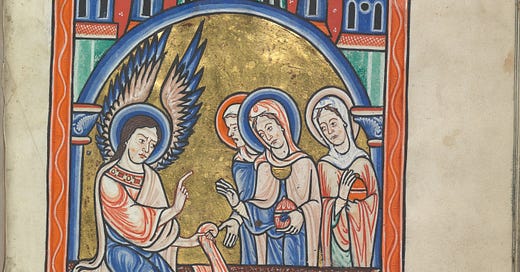The image is of the three Maries at the empty tomb from the Psalter of Eleanor of Aquitaine [ca. 1185]. What does the illumination teach?
Questions
1 Now if Christ is preached as raised up from the dead, how do some among you say that there is no resurrection of the dead?
What issue does Paul address regarding the resurrection in 1 Corinthians 15:12?1
How did the Graeco-Roman world view the resurrection of the body?2
13 But if there is no resurrection of the dead, Christ has not been raised either.
What is the consequence if there is no resurrection of the dead?3
14 But if Christ has not been raised, then our preaching is in vain, and your faith is in vain. 15 And also we are found to be false witnesses of God, because we testified against God that he raised Christ, whom he did not raise if after all, then, the dead are not raised. 16 For if the dead are not raised, Christ has not been raised either. 17 But if Christ has not been raised, your faith is empty; you are still in your sins. 18 And as a further result, those who have fallen asleep in Christ have perished. 19 If we have put our hope in Christ in this life only, we are of all people most pitiable.
What does Paul say about our Christian hope if Christ has not been raised?4
20 But now Christ has been raised from the dead, the first fruits of those who have fallen asleep.
What is the significance of Jesus being called the “first fruits” of those who have fallen asleep?5
How does the passage describe the relationship between Jesus’ resurrection and the resurrection of believers?6
21 For since through a man came death, also through a man came the resurrection of the dead. 22 For just as in Adam all die, so also in Christ all will be made alive.
How does Paul connect Adam and Christ in relation to death and resurrection?7
23 But each in his own group: Christ the firstfruits, then those who are Christ’s at his coming, 24 then the end, when he hands over the kingdom to the God and Father, when he has abolished all rule and all authority and power. 25 For it is necessary for him to reign until he has put all his enemies under his feet. 26 The last enemy to be abolished is death.
What is the ultimate enemy that Jesus will abolish?8
What does this imply about the mortality of the human soul?9
27 For “he subjected all things under his feet.” But when it says “all things” are subjected, it is clear that the one who subjected all things to him is not included. 28 But whenever all things are subjected to him, then the Son himself will be subjected to the one who subjected all things to him, in order that God may be all in all.
How is Jesus subduing the nations and bringing them under his rule before giving them back to the Father?10
Paul is deeply concerned that some among the church in Corinthian were saying there is no resurrection of the dead, i.e questioning the core Christian belief in bodily resurrection.
How did the Graeco-Roman world view the resurrection of the body?
Christ was not raised either.
What does Paul say about faith if Christ has not been raised?
What is the significance of Jesus being called the “first fruits” of those who have fallen asleep?
The passage teaches that Jesus’ resurrection is not unique; all who are in Christ will be physically raised from the dead, and Jesus’ resurrection and believers’ resurrection are inseparable and one and the same thing.
Paul explains that just as death came through a man [Adam], the resurrection of the dead also comes through a man [Christ]. In Adam all die, but in Christ all will be made alive.
The last enemy to be abolished is death.
The passage suggests that the human soul is not inherently eternal; rather, eternal life is a precious gift from God, given through the resurrection of Jesus.
Jesus is subduing the nations through his church as required by the Great Commission. Jesus’ weapon is not the sword by regeneration by the Holy Spirit.




